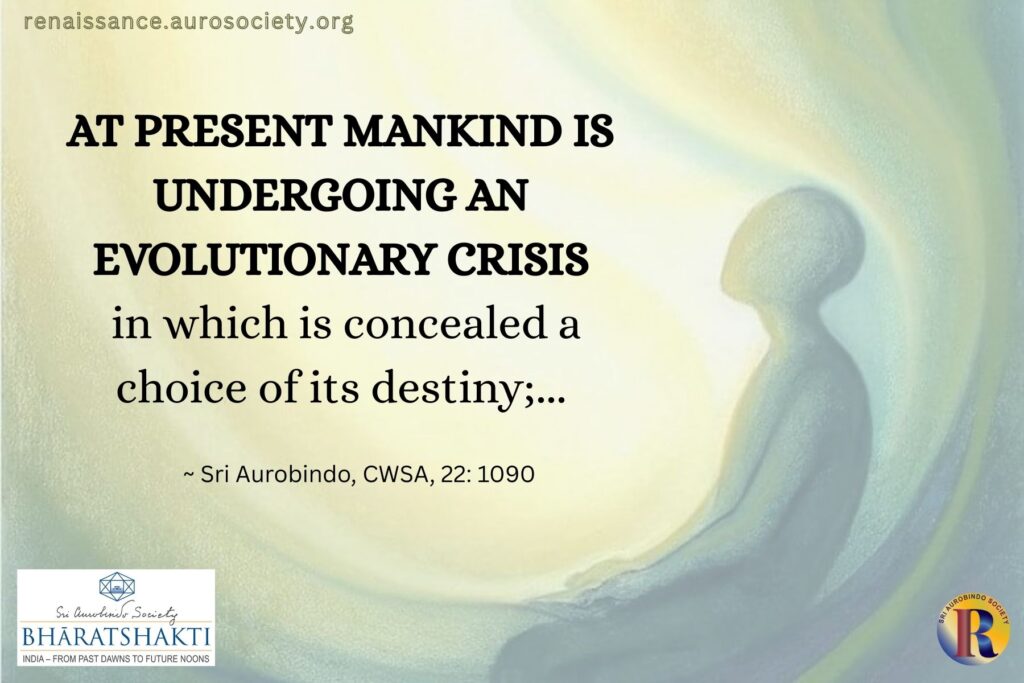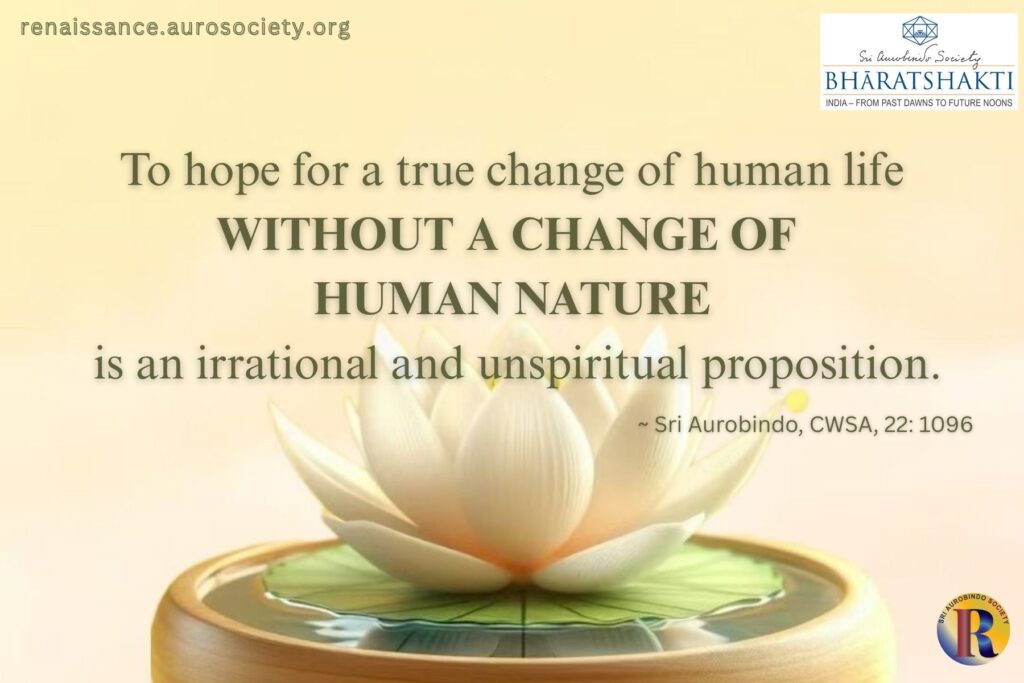Vol. III, Issue 5
Author: Sri Aurobindo and The Mother
Editor’s note: For our guiding light feature, we have selected a few short passages from the Mother and Sri Aurobindo which shed bright light on some key facets related to our theme ‘Generosity’. The themes highlighted in these passages are elaborated upon in other features in the issue.

Generosity – a Psychic Quality
Sometimes, when one sees a generous act, hears of something exceptional, when one witnesses heroism or generosity or greatness of soul, meets someone who shows a special talent or acts in an exceptional and beautiful way, there is a kind of enthusiasm or admiration or gratitude which suddenly awakens in the being and opens the door to a state, a new state of consciousness, a light, a warmth, a joy one did not know before.
~ The Mother, CWM, Vol. 8, p. 405
. . . the capacity for enthusiasm, something which throws you out of your miserable and mean little ego; and the generous gratitude, the generosity of the gratitude which also flings itself in thanksgiving out of the little ego. These are the two most powerful levers to enter into contact with the Divine in one’s psychic being. This serves as a link with the psychic being—the surest link.
~ The Mother, CWM, Vol. 7, pp. 418-419
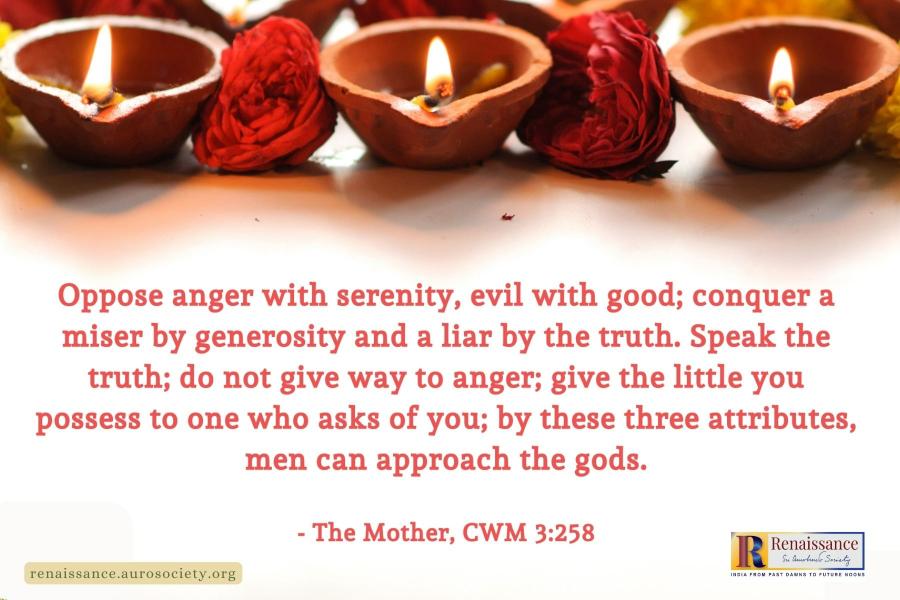
Moral Generosity
. . . as soon as one becomes rich one thinks more often of keeping one’s wealth than of giving it away. The more men possess, the less are they generous.
I want to speak of moral generosity. To feel happy, for example, when a comrade is successful. An act of courage, of unselfishness, a fine sacrifice have a beauty in them which gives you joy.
It may be said that moral generosity consists in being able to recognise the true worth and superiority of others.
~ The Mother, CWM, Vol. 4, p. 30
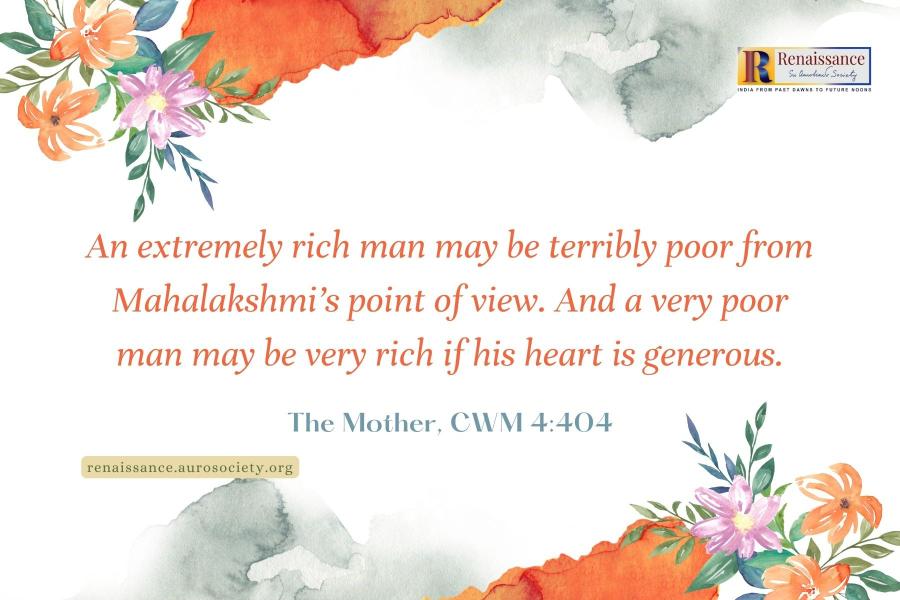
The Demand of the Mahalakshmi
Harmony and beauty of the mind and soul, harmony and beauty of the thoughts and feelings, harmony and beauty in every outward act and movement, harmony and beauty of the life and surroundings, this is the demand of Mahalakshmi. Where there is affinity to the rhythms of the secret world-bliss and response to the call of the All Beautiful and concord and unity and the glad flow of many lives turned towards the Divine, in that atmosphere she consents to abide.
But all that is ugly and mean and base, all that is poor and sordid and squalid, all that is brutal and coarse repels her advent. Where love and beauty are not or are reluctant to be born, she does not come; where they are mixed and disfigured with baser things, she turns soon to depart or cares little to pour her riches.
If she finds herself in men’s hearts surrounded with selfishness and hatred and jealousy and malignance and envy and strife, if treachery and greed and ingratitude are mixed in the sacred chalice, if grossness of passion and unrefined desire degrade devotion, in such hearts the gracious and beautiful Goddess will not linger.
A divine disgust seizes upon her and she withdraws, for she is not one who insists or strives; or, veiling her face, she waits for this bitter and poisonous devil’s stuff to be rejected and disappear before she will found anew her happy influence.
Ascetic bareness and harshness are not pleasing to her nor the suppression of the heart’s deeper emotions and the rigid repression of the soul’s and the life’s parts of beauty.
For it is through love and beauty that she lays on men the yoke of the Divine. Life is turned in her supreme creations into a rich work of celestial art and all existence into a poem of sacred delight; the world’s riches are brought together and concerted for a supreme order and even the simplest and commonest things are made wonderful by her intuition of unity and the breath of her spirit.
~ Sri Aurobindo, CWSA, Vol. 32, p. 21
Being Rich, Happy and Generous
Yes, poor, without generosity, without ardour, without amplitude, without inner richness; all that is dry, cold, doubled upon itself, prevents the coming of Mahalakshmi. It is not a question of real money, you know! An extremely rich man may be terribly poor from Mahalakshmi’s point of view. And a very poor man may be very rich if his heart is generous.
. . . A poor man is a man having no qualities, no force, no strength, no generosity. He is also a miserable, unhappy man. Moreover, one is unhappy only when one is not generous—if one has a generous nature which gives of itself without reckoning, one is never unhappy. It is those who are doubled up on themselves and who always want to draw things towards themselves, who see things and the world only through themselves—it is these who are unhappy.
But when one gives oneself generously, without reckoning, one is never unhappy, never. It is he who wants to take that is unhappy; he who gives himself is never so.
~ The Mother, CWM, Vol. 4, p. 404
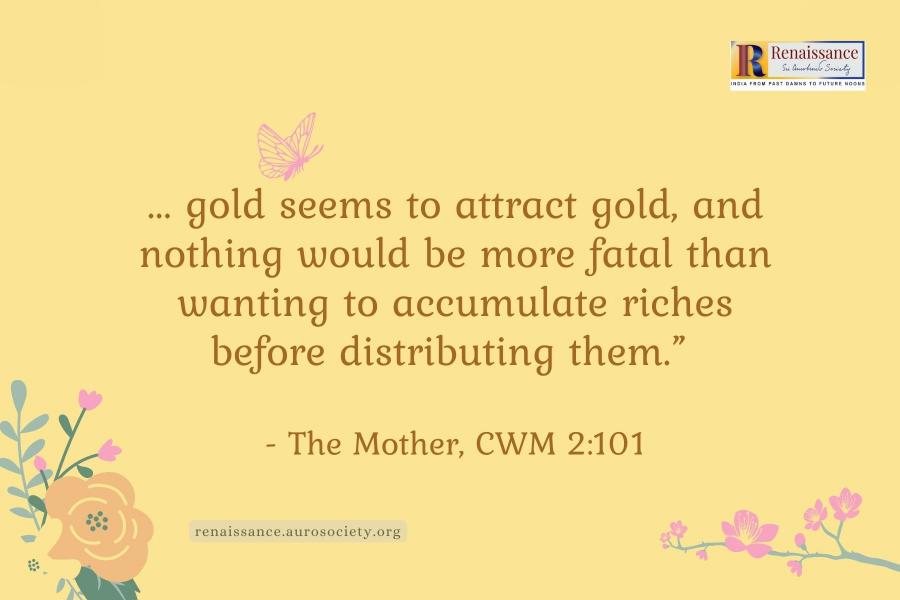
It is infinitely more difficult to be good, to be wise, to be intelligent and generous, to be more generous, you follow me, when one is rich than when one is poor. I have known many people in many countries, and the most generous people I have ever met in all the countries, were the poorest. And as soon as the pockets are full, one is caught by a kind of illness, which is a sordid attachment to money. I assure you it is a curse.
…the first thing to do when one has money is to give it. But as it is said that it should not be given without discernment, don’t go and give it like those who practise philanthropy, because that fills them with a sense of their own goodness, their generosity and their own importance.
You must act in a sattwic way, that is, make the best possible use of it. And so, each one must find in his highest consciousness what the best possible use of the money he has can be. And truly money has no value unless it circulates. For each and every one, money is valuable only when one has spent it.
~ The Mother, CWM, Vol. 7, p. 54
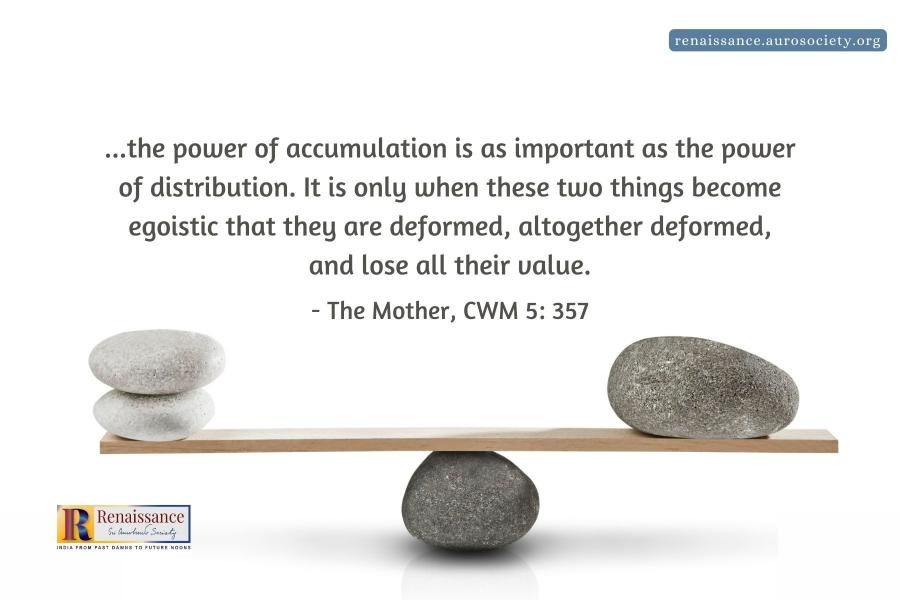
Being Generous or Being Miserly
The ordinary social notions distinguish between two classes of men,—the generous, the avaricious. The avaricious man is despised and blamed, while the generous man is considered unselfish and useful to society and praised for his virtue. But to the spiritual vision, they both stand on the same level; the generosity of the one, the avarice of the other are deformations of a higher truth, a greater divine power.
There is a power, a divine movement that spreads, diffuses, throws out freely forces and things and whatever else it possesses on all the levels of nature from the most material to the most spiritual plane. Behind the generous man and his generosity is a soul-type that expresses this movement; he is a power for diffusion, for wide distribution.
There is another power, another divine movement that collects and amasses; it gathers and accumulates forces and things and all possible possessions, whether of the lower or of the higher planes. The man you tax with avarice was meant to be an instrument of this movement.
Both are important, both needed in the entire plan; the movement that stores up and concentrates is no less needed than the movement that spreads and diffuses.
~ The Mother, CWM Vol. 3, pp. 119-120
Also read:
Practicing Higher Virtues as Aids to Inner Evolution
Generosity, a Virtue?
All the virtues—you may glorify them—increase your self-satisfaction, that is, your ego; they do not help you truly to become aware of the Divine. It is the generous and wise people of this world who are the most difficult to convert. They are very satisfied with their life.
A poor fellow who has done all sorts of stupid things all his life feels immediately sorry and says: “I am nothing, can do nothing. Make of me what You want.” Such a one is more right and much closer to the Divine than one who is wise and full of his wisdom and vanity. He sees himself as he is.
~ The Mother, CWM, Vol. 5, p. 14

~ Design: Raamkumar


